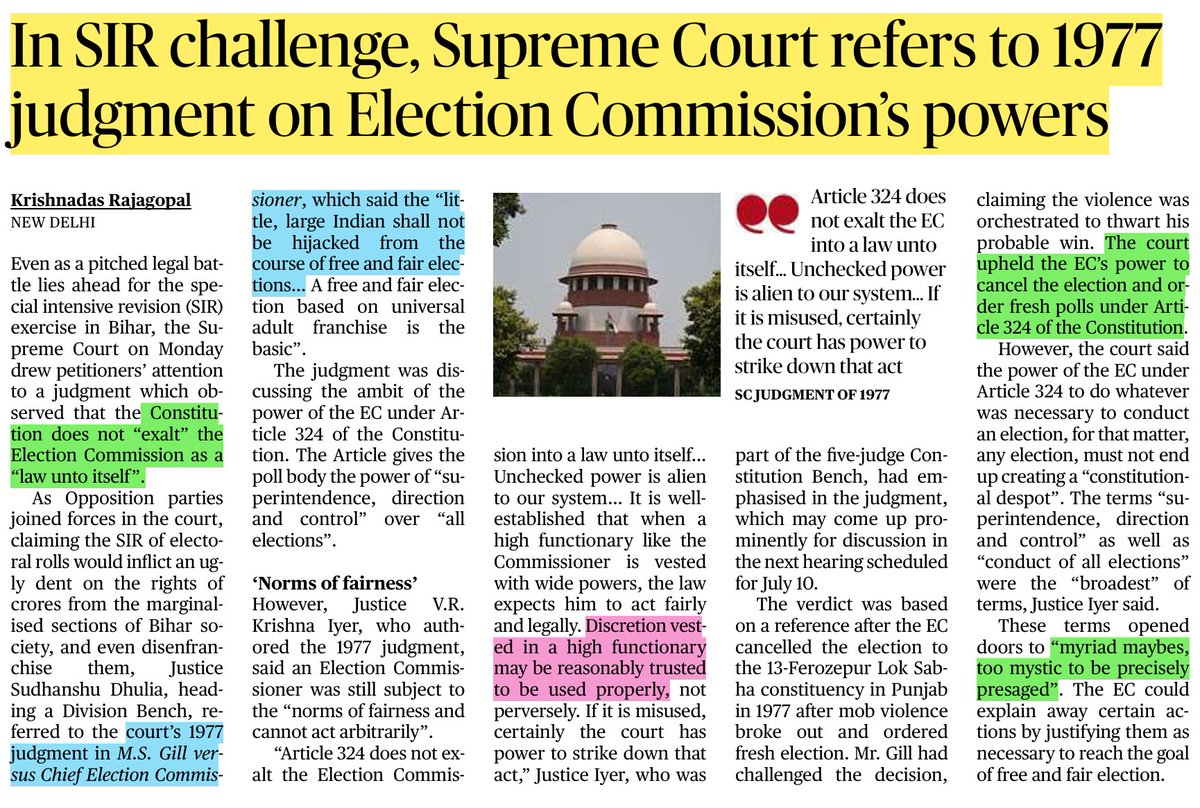
08-Jul-2025 05:38 PM
In a case challenging the Special Intensive Revision (SIR) of electoral rolls in Bihar, the Supreme Court referred to its landmark 1977 judgment in M.S. Gill vs. Chief Election Commissioner. The court highlighted the limits and accountability of the Election Commission’s powers under Article 324 of the Constitution.
What is the SIR Dispute?
Opposition Allegation: The Special Intensive Revision of electoral rolls could potentially disenfranchise marginalized communities in Bihar.
Petitioners’ Concern: Large-scale deletion or scrutiny without safeguards may violate the constitutional right to vote.
Election Commission’s Argument: The SIR is a legitimate administrative action to update and clean electoral rolls.
Article 324 – Powers of the Election Commission:
Article 324 grants the Election Commission (EC) the power of “superintendence, direction and control” of elections to Parliament, state legislatures, and offices of President and Vice-President.
This power is broad but not absolute.
The 1977 M.S. Gill Judgment: Key Takeaways
Context: The EC had cancelled the election to the Ferozepur Lok Sabha seat in 1977 due to mob violence. The decision was challenged.
SC’s Verdict: The EC was empowered to cancel the election and hold fresh polls, under Article 324.
But, Justice V.R. Krishna Iyer cautioned that:
“Article 324 does not exalt the Election Commission into a law unto itself… Unchecked power is alien to our system.”
EC must act within norms of fairness and legality. If it misuses discretion, the court can intervene.
The broad terms like “superintendence, direction and control” are not a license for constitutional despotism.
Constitutional and Legal Significance:
Checks and Balances:
Reinforces that even constitutional authorities like EC are accountable and subject to judicial review.
No functionary, even one protecting democracy, is above the Constitution.
Protection of Electoral Rights:
SC’s reference to M.S. Gill ensures that electoral processes remain inclusive, especially for the marginalized sections.
Electoral roll revision must not be arbitrary or exclusionary.
Electoral Reforms and Due Process:
Underscores the need for procedural safeguards during voter list revisions.
Electoral integrity must not come at the cost of disenfranchisement.
Implications Going Forward:
The SC’s mention of this case signals that the court will closely scrutinize EC’s actions in Bihar.
Sets the tone for balancing electoral integrity with constitutional morality.
Likely to spark wider discussions on electoral reforms, especially on:
Voter deletion processes
Inclusion of vulnerable groups
Role of technology and Aadhaar in elections
Conclusion:
The Supreme Court’s reference to the M.S. Gill case is a timely reminder that while the Election Commission is entrusted with great responsibilities, it must exercise its powers with transparency, accountability, and fairness. The ongoing SIR dispute will test the balance between administrative necessity and constitutional safeguards — central to the health of India’s electoral democracy.
UPSCMains Practice Question
Ques:While Article 324 of the Constitution vests wide powers in the Election Commission, such powers are not absolute and must be exercised within the boundaries of fairness and legality. In light of the recent Supreme Court observations during the Bihar Special Intensive Revision (SIR) case and the 1977 M.S. Gill judgment, critically examine the scope and limits of the Election Commission’s powers.